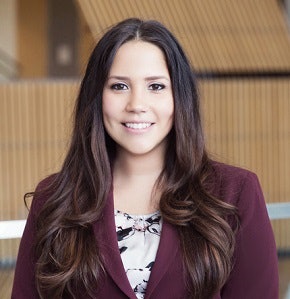Constanza “Connie” Cabello’s hope for implementing change has come full circle.
A native of Chile, the Latina and first-generation college student from an immigrant family knew that she wanted to give back, do meaningful work and change systems that create barriers and challenges for people to be successful.
Cabello acknowledges that her family always expected her to go to college. She initially entered school intending to become a lawyer.
 Connie Cabello
Connie CabelloHowever, after she became involved in a number of student leadership positions in cultural organizations and Greek life, and after speaking with a supervisor while serving as a student organization peer adviser in the student activities department, a new interest to enter higher education emerged.
Fully aware of the challenges of being an underrepresented student on campus, Cabello planned to mentor and coach students and serve as a source of “inspiration, hope and guidance” for them to succeed in higher education, she says.
“As I’ve come up in the field, I’ve recognized that some of the reasons I initially wanted to go into law and policy were to impact change for underserved communities, and I find myself doing that in my work in higher education now,” Cabello adds. “It kind of came full circle.”
Now in her role as director of the Office of Intercultural Affairs at Stonehill College, Cabello takes an asset-based approach — as opposed to a deficit approach — to serving her students that come from underrepresented backgrounds, focusing on the “unique skills, talents and experiences they have that make them remarkable,” she says.
She also approaches the work she does in the intercultural affairs office as an educator role for all students, faculty and staff on campus.
“While we are primarily charged with supporting underrepresented student communities on our campus, I view our role as being a vessel for [people of] all identities to become educated on issues of social justice,” she says.
Throughout the year, Cabello’s office hosts programming that includes traditional cultural center type of events as well as specialized advocacy and professional development programs. Her office is currently preparing for an identity-based graduation ceremony.
Students can participate in additional programs such as the pre-orientation program; the intercultural experience program; programs around various heritage months; and the peer leadership-peer mentorship program, “Advocates for a Brighter Stonehill Leadership Program.”
“Even though we’re a small office, we’re doing quite a bit,” Cabello says.
Cabello’s office partnerships with faculty — including strong collaborations with the director of human resources, the director of the Center for Teaching and Learning and the associate provost for assessment, diversity and faculty development — have led to various professional development opportunities, such as exploring identity workshops and bystander intervention trainings for faculty and staff.
“We all really work closely to ensure that the employees feel like they have opportunities to grow and learn, as well,” she says, adding that if administrators are only working with students, “we’ve missed a huge part of our community.”
And while the institution does not have a chief diversity officer, officials created an Institutional Diversity Action Committee led by college president Rev. John Denning in 2016 that is charged with prioritizing and monitoring the implementation and progress of the recommendations and plans set forth to enhance and demonstrate the college’s commitment to diversity, specifically related to ethnically and racially underrepresented groups. “That’s been really exciting for us,” Cabello says.
The action committee’s intentional efforts have resulted in several initiative outlines: a review of curriculum, hiring practices of faculty and staff and policies that will enhance the retention and success of Stonehill students.
Beyond her work at Stonehill, another academic and career milestone for Cabello has been her pursuit of an Ed.D. in organizational leadership studies at Northeastern University. Her research focuses on Latinx/a/o higher education administrators and their experiences responding to racial bias incidents in the New England area.
Cabello examines much of her coursework through a social justice lens and adds that her “critical eye” for understanding power and privilege within organizations as they relate to identity, particularly in a higher education setting, enables her to think about how educators can unpack and address some of the “complex” diversity problems institutions face today, she says.
She also keeps her students in mind.
“A lot of my inspiration for pursuing this degree was to show my students that Latinx/a/o people can do this,” she says, adding, “Students from immigrant families, you can do this; first-gen students, you can do this.”
An involved member in NASPA-Student Affairs Administrators in Higher Education, Cabello’s work advocating, supporting and elevating historically underrepresented voices in higher education will continue at Stonehill and beyond.
“I want to see higher education achieve true inclusion and, beyond inclusion, become equitable,” Cabello says. “If I can be part of that, I’ll be gratified.”
Tiffany Pennamon can be reached at [email protected]
This article appears in the April 19 issue of Diverse.
















